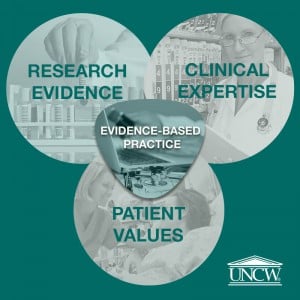Evidence-based practice integrates the best current research evidence with clinical expertise and patient values to improve healthcare outcomes. Nurses today face the challenges of increasingly complex patient needs and rapidly changing medical environments. Healthcare demands highly skilled professionals who apply their knowledge and experience to each patient’s unique circumstances to produce better results. This is where evidence-based practice enters the picture.
The online Registered Nurse to Bachelor of Science in Nursing (RN to BSN) program from the University of North Carolina Wilmington (UNCW) prepares nurses to implement evidence-based care through dedicated coursework in research, health assessment and leadership. In UNCW’s program, nurses can transfer in all prerequisite credits, allowing them to focus on the 30 credit-hour nursing curriculum and complete their BSN in as few as 12 months.
What Is Evidence-based Practice in Nursing?
Evidence-based practice (EBP) in nursing combines three essential components: Best research evidence, clinical expertise and patient values and preferences. The EBP approach maintains that the use of substantiated evidence combined with clinical expertise and responsiveness to patient values provides a beneficial framework to improve and optimize patient care.
Clinical expertise enables nurses to interpret research findings within the unique context of individual patient situations. Research evidence provides the scientific foundation for clinical decisions, while patient values ensure care remains person-centered and respectful of individual preferences. Together, these components create a comprehensive approach to nursing practice that elevates both care quality and patient satisfaction.
Why Evidence-based Practice Improves Patient Outcomes and Nursing Quality
As patients’ needs become more complex and healthcare options become more varied, nurses must use problem-solving approaches like evidence-based practice. Research demonstrates that evidence-based practice in nursing directly correlates with improved patient outcomes. According to a 2023 systematic review published in Worldviews on Evidence-based Nursing, EBP improves patient outcomes and healthcare system return on investment. The review found that EBP consistently links to improved quality of care, patient safety and positive clinical outcomes across healthcare settings. Evidence-based approaches help more patients recover successfully and return home sooner.
Data from the American Association of Colleges of Nursing (AACN) confirms that BSN-prepared nurses demonstrate stronger competencies in clinical judgment, leadership and evidence-based practice. A wealth of research aggregated by AACN shows that hospitals with higher percentages of BSN-prepared nurses experience positive outcomes such as lower congestive heart failure mortality, fewer hospital-acquired pressure ulcers and shorter patient lengths of stay.
Evidence-based Practice Steps for Nurses
Nurses who implement evidence-based practice follow systematic steps to translate research into clinical care. These steps provide a structured framework for integrating current evidence into patient care decisions:
- Formulate compelling clinical questions by identifying and defining problems
- Review current research evidence to determine the most effective interventions
- Implement evidence-based care plans by appraising and providing appropriate treatments
- Evaluate patient responses by reassessing within determined intervals
- Disseminate findings to improve practice across healthcare settings
This systematic approach enables nurses to translate research findings into actionable improvements in patient care. Additionally, evidence-based practice supports continuous learning and quality improvement, ensuring nursing care evolves alongside medical advances and patient needs.
How BSN Education Strengthens Evidence-based Nursing Practice
The research noted above confirms that quality patient care correlates directly with a well-educated workforce. Nurses who earn a BSN degree through qualified online RN to BSN programs deliver a level of care that significantly improves patient outcomes. Baccalaureate education positively affects a nurse’s ability to provide care.
UNCW’s online RN to BSN program includes courses such as Research in Nursing, which introduces research design, analysis processes and evidence-based practice frameworks. Students develop skills in critically evaluating research literature, applying evidence to clinical situations and leading evidence-based practice initiatives in their healthcare settings. The program’s comprehensive curriculum prepares nurses to champion evidence-based approaches throughout their careers.
Learn more about UNCW’s online RN to BSN program.
